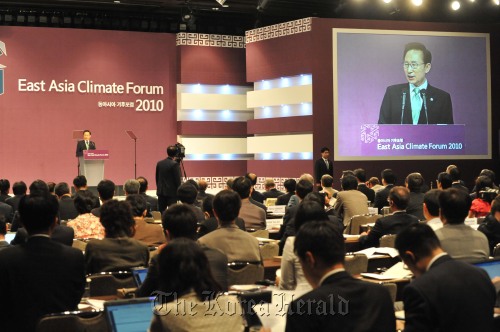President Lee Myung-bak said Wednesday that the nation’s new green growth institute will play a leading role in harmonizing environment protection with economic growth.
“I’ll ensure that the Global Green Growth Institute will evolve into a permanent common asset of the international community by 2012,” Lee said, declaring the institution’s official launch at the East Asia Climate Forum in Seoul.
 |
| President Lee Myung-bak delivers a speech at the East Asia Climate Forum in Seoul on Wednesday. Chung Hee-cho/The Korea Herald | As part of the government’s green initiatives, the Seoul-based institute is aimed at mapping out strategy and policy for environmentally sustainable growth and supporting similar efforts in developing countries.
President Lee had announced such a plan earlier when he was attending a climate summit in Copenhagen last December.
In his speech Wednesday, Lee also made it clear that the international community was faced with both the “limits of growth” as well as the “need for growth.” While about 1.2 billion people around the world are still suffering from extreme poverty earning less than $1 a day, advanced countries do not want to see an end to growth, he said.
“The nation’s vision of low carbon green growth is our answer,” he said.
“Green growth is a bold and innovative answer to the dilemma we are facing today. Green growth will foster green industries, find the next engines of growth and create new and better jobs.”
In order to translate this vision into reality, the Korean government has come up with a five-year plan on green growth and the National Assembly has also approved a related law.
“My government will continue to expand its R&D investments in its green industries. It will also modify and improve its tax system and financial regulations so that green entrepreneurship can flourish,” he said.
U.N. Secretary-General Ban Ki-moon also expressed his confidence about the future role of the green growth institute in his video message.
“The GGGI will significantly contribute to a variety of the U.N.’s activities regarding climate change,” he said.
Nicholas Stern, another keynote speaker and professor at the London School of Economics and Political Science, said that the green leadership of Korea, a country which is a “guiding light” for economic development, particularly for the developing world, would become a great asset for the GGGI.
He also stressed that the new institute was required to build world-class analysis capabilities to provide meaningful green growth methodologies to the world.
The Korean government has decided to fund about $10 million each year by 2012 for the institute, which will be headed by former Prime Minister Han Seung-soo, while seeking additional financing from foreign governments and foundations.
The board members of the GGGI held their first meeting on Tuesday, attended by Thomas Heller, professor at Stanford University, Vice Minister of Foreign Affairs and Trade Shin Kak-soo and Kim Sang-hyup, co-secretary general to the Presidential Committee on Green Growth.
During the meeting, three countries -- Indonesia, Brazil and Ethiopia -- were selected as the beneficiaries of the GGGI’s first support programs for green growth planning.
The board also agreed that the institute would conduct a joint project with the University of Oxford to develop a model which analyzes the amount of potential emission reductions.
|